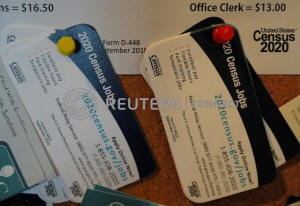|
Supreme Court hears dispute over Trump
census citizenship question
 Send a link to a friend
Send a link to a friend
 [April 23, 2019]
By Andrew Chung and Lawrence Hurley [April 23, 2019]
By Andrew Chung and Lawrence Hurley
WASHINGTON (Reuters) - The U.S. Supreme
Court, in one of the most consequential cases of its current term, on
Tuesday will hear the Trump administration's bid to add a citizenship
question to the 2020 census, a plan opponents have called a Republican
effort to scare immigrants from taking part in the population count.
Lower courts have blocked the question, ruling that the administration
violated federal law and the U.S. Constitution in seeking to include it
on the census form. The nine Supreme Court justices will hold an
extended 80-minute argument session in the administration's appeal, with
a ruling due by the end of June.
The case comes in a pair of lawsuits by a group of states and localities
led by New York state, and a coalition of immigrant rights groups
challenging the legality of the question. The census forms are due to be
printed in the coming months.

The official population count, as determined by the census, is used to
allot seats in the U.S. House of Representatives and distribute some
$800 billion in federal funds.
Opponents have said inclusion of the question would cause a severe
undercount by frightening immigrant households and Latinos from filling
out the census, fearful that the information would be shared with law
enforcement. This would cost Democratic-leaning areas electoral
representation in Congress and federal aid, benefiting
Republican-leaning parts of the country, they said.
President Donald Trump, a Republican, has pursued hardline immigration
policies. His administration said the citizenship question would yield
better data to enforce the Voting Rights Act, which protects eligible
voters from discrimination.
Business groups and corporations such as Lyft, Inc, Box, Inc, Levi
Strauss & Co and Uber Technologies Inc also opposed the citizenship
question, saying it would compromise census data that they use to make
decisions including where to put new locations and how to market
products.
[to top of second column]
|

Advertisements for 2020 Census Jobs are posted at a restaurant in
Concord, New Hampshire, U.S., February 18, 2019. REUTERS/Brian
Snyder

Manhattan-based U.S. District Judge Jesse Furman on Jan. 15 ruled
that the Commerce Department's decision to add the question violated
a federal law called the Administrative Procedure Act. Federal
judges in Maryland and California also prohibited the question's
inclusion in subsequent rulings, saying it would violate the
Constitution's mandate to enumerate the population every 10 years.
Furman found that Commerce Secretary Wilbur Ross, whose department
includes the Census Bureau, concealed his true motives for his March
2018 decision to add the question.
The Census Bureau itself estimated that households corresponding to
6.5 million people would not respond to the census if the
citizenship question is asked, leading to less accurate citizenship
data.
Citizenship has not been asked of all households since the 1950
census. It has featured since then on questionnaires sent to a
smaller subset of the population. While only U.S. citizens can vote,
non-citizens comprise an estimated 7 percent of the population.
(Reporting by Andrew Chung and Lawrence Hurley; Editing by Will
Dunham)
[© 2019 Thomson Reuters. All rights
reserved.]
Copyright 2019 Reuters. All rights reserved. This material may not be published,
broadcast, rewritten or redistributed.
Thompson Reuters is solely responsible for this content.
 |